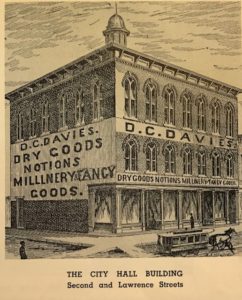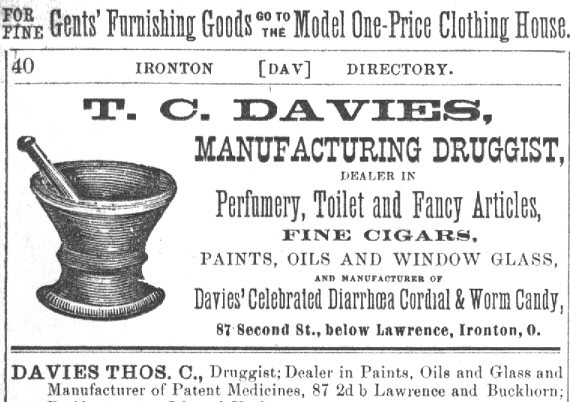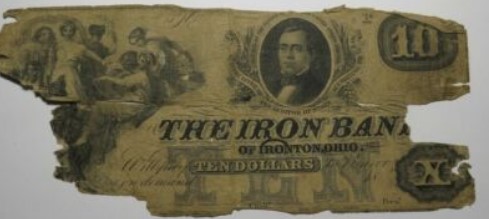Early Ironton, Ohio, Recollections
Ironton Register, Thursday, June 13, 1895
For the Register:
The dropping off of some of my old familiar friends lately had brought to my mind the faces and forms of long ago, when Ironton did not cover one-fourth of the space it occupies now on the map of Ohio.
My first acquaintance with it was in the spring of 1853 when as a boy of nine years old, I was brought over from Wales and started to grow into the spirit and stature of an American. The first school I attended was in the second story of part of the block where D. C. Davies now holds forth.
There was no plastering on the walls, and the seats were rough joists laid on timbers, without backs. The teachers tried to place each class together so they would not be required to climb over, but she could go to them, which she frequently did by stepping from one joist to another. Despite all these disadvantages, we learned rapidly and had many encouraging words from teachers and visitors, for it was fashionable then to visit the schools.
Rev. Joseph Chester, a Presbyterian minister, I believe, spent every Monday in attendance at the various schools. I sued to think he knew everything, and when a word was misspelled, he would show the error on the old blackboard, and if I chance to miss a word now when forty years have passed away, it is not one of those he kindly wrote out for us on the board. Rev. Dan Young, one of our Methodist pioneers, Dr. N. K. Moxley, Sr., Dr. W. F. Willson, and Dr. C. B. Egerton were also great friends of the school and more than occasional visitors.
A great many general knowledge facts were imparted to us by the nice little talks they gave us, and the great encouragement of their successful lives showed us the possibility of success sometime in the future. Capt. J. S. George and S. P. Calvin, and Hon. Ralph Leete, among the attorneys, gave us an occasional visit, and all of these gentlemen did not count it beneath their dignity to talk to us on the street or inquire about the schools.
When the project for building the “old brick” was sprung, what turmoil was there among the voters, and how many said that such an expensive building should never be attempted? Many a man said he had nothing better than “an old cabin for a school room and puncheon seats, which were good enough for anybody.” When we left school in the evening, we passed down to the corner of Third and Centre streets, where Dr. B. F. Cory was Postmaster under the Democratic administration. Ironton, as well as Lawrence county, were strongly entrenched in that faith at the time.

Quite a number of foreign residents then lived in town, and a letter coming or going from one of these called for a twenty-five cent stamp, and they sometimes came to be collected here. Dr. Sloan had set up his practice here then but was regarded merely as a tooth extractor, for it was not common to see people have stored teeth at that time. Shade Ward and his clerk, Clem Boothe, were leading authorities on Dry Goods, and J. T. Davis, with his excellent wife, Mary Davis, held forth on the corner of Second and Lawrence streets, opposite D. T. Miles’ store.
A. P. Kouns and Sons carried on a large Grocery and Provision establishment where T. L. Collett now has his insurance office. Mr. William Hamilton had an excellent grocery at Gohlson’s stand on Railroad street, and Moxley, Barber, and Egerton had a large drug store not far from Ball and Warfield’s present stand. Mr. Richards, himself a hatter, had great trade in hats and furnishings. Henry Wilson, one of the best natural singers in Ohio, was also a saddle and harness maker but, above all else, a dyed-in-the-wool Methodist. Thos. McCarthy and R. O. Evans (Dick y Crydd) were authorities on shoes and leather, frequently working together, but the first was a hopeless Democrat, and the other an irrepressible abolition Republican.

The Iron Bank did most of the business and was run principally by the Willards, and Mr. I. C. Dovel carried on the banking business for W. D. Kelly. When a person bought anything at a store, he usually presented a State bank bill to change, and the merchant would consult a large bank directory he had to see what discount was on the bill. If it were Kentucky money, you would lose 25%; Virginia, 33 1/3%; Caroline, or Georgia, 50%, and even Ohio Trust bank would lose 20 %, and it often happened that the merchant came back and said the bill was worthless. How those poor souls were tried. A whole week’s pay sometimes was worthless, and the penny saved for a rainy day was examined to find that the bank that issued it was as dead as Hector. A merchant would save his money to pay a bill and find at his bank that only about half of it would pass and that at a discount.
The honest effort became fruitless toil, and men gave way to stagnation because it was like “making bricks without straw.” This did not relieve the people from the usual burdens of taxation and expense to keep up churches and ministers, so, in reality, we had much harder times then than now. There can come no doubt about the money now, for every dollar has its gold backing in the Treasury, and even the old veteran pensioner knows his pittance is worth one hundred percent to the dollar. A little of the experience of those bygone days would show any thoughtful poor man, who gets but his dollar for his day’s work, that the more valuable the dollar, the more he gets for his work. Most of the people of whom I have spoken have passed on to their reward, and the schoolboys are now the gray and “reverent seignors.”
A new generation is rearing its young and telling of its early associations. Would that the mantle of the earnestness, honesty, and principle of Ironton before the war would fall on the generations to come so that our descendants would be resplendent with manhood unexcelled by any people in the world? With these old-time friends and the great majority, we soon shall sleep beneath the willows, for “Time, like a never changing stream. Bears all its sons away.”
PILGRIM.

0 Comments